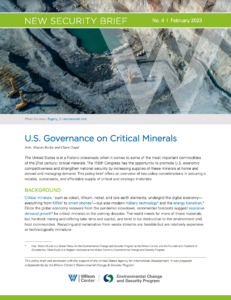Full Title: U.S. Governance on Critical Minerals
Author(s): Hon. Sharon Burke and Claire Doyle
Publisher(s): Wilson Center
Publication Date: February 15, 2023
Full Text: Download Resource
Description (excerpt):
Critical minerals, such as cobalt, lithium, nickel, and rare earth elements, undergird the digital economy – everything from MRIs to smart phones – but also modern military technology and the energy transition. Once the global economy recovers from the pandemic slowdown, commercial forecasts suggest explosive demand growth for critical minerals in the coming decades. The world needs far more of these materials, but hardrock mining and refining take time and capital, and tend to be destructive to the environment and host communities. Recycling and reclamation from waste streams are feasible but are relatively expensive or technologically immature.
The United States and key allies, such as Australia and Canada, have significant mineral wealth and competitive international mining companies, but a number of other countries dominate critical mineral markets. China and Russia, in particular, are major producers at home and around the world, but they tend to approach mining in a way that encourages corruption, undermines the environment, runs roughshod over community rights, and uses non-market tools. Other important producers of specific minerals include (but are not limited to) Brazil, the Democratic Republic of the Congo, Indonesia, the Philippines, and South Africa.
While the current and previous administration and past Congresses have launched important initiatives to improve U.S. critical minerals policy—including landmark changes in the Bipartisan Infrastructure Law, Inflation Reduction Act, and CHIPS and Science Act—there is still room to adopt more policies for a better, smarter, cleaner, and fairer approach to mining.
